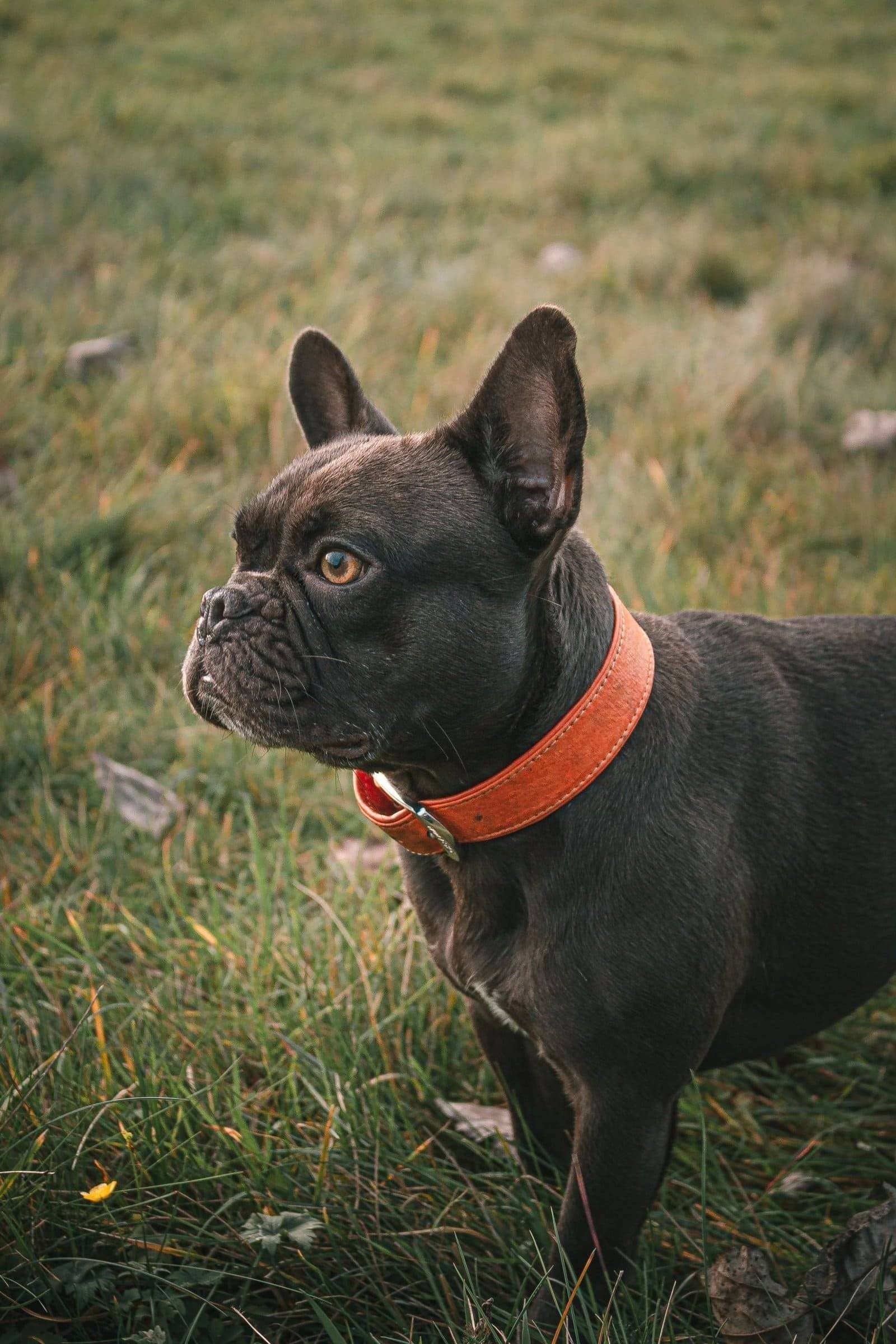Has your French Bulldog been going through unusual health and behavioral issues lately? Worried that certain symptoms, like mouth breathing and gastrointestinal issues, might be signs of BOAS?
In this article, we will be exploring the signs of detecting BOAS in your French Bulldog, as well as when to visit the vet.
Learning about its early signs can help dog owners catch the disease before its progression. The more awareness, the higher the chances of seeking veterinary care on time and managing complications.

Let’s dive deeper into how you can detect signs of BOAS in your Frenchie and seek timely care:
What is BOAS?
BOAS (Brachycephalic Obstructive Airway Syndrome) is a common condition in dogs, particularly affecting French Bulldogs. Due to their short skull shape, this small breed is prone to airway obstructions and breathing difficulties. BOAS requires prompt veterinary attention, as it can have long-term effects on a dog’s health.
To support veterinary professionals in managing this condition, Vet and Tech, a leading veterinary education platform, has hosted a sponsored veterinary webinar on Evaluating BOAS in Dogs. Veterinarians worldwide attend these online webinars to advance their continuing education and improve the quality of care they provide to their patients.
Now that we know what BOAS in dogs is, let’s explore the common signs of BOAS in French Bulldogs.
Common Signs of BOAS:
Most dogs with BOAS find it easier to breathe through their mouth, rather than their nose. If you’re noticing the following abnormalities increasingly, the chances of the severity may be higher:
Reduced exercise is also seen in dogs with BOAS. They may gag when they try to swallow. Breathing becomes difficult and loud. Many dogs also breathe with their mouths open. In severe cases, the gums may become a bluish discoloration.
The signs of BOAS are discussed in detail below.
Breathing Difficulties
Dogs suffering from BOAS experience noisy breathing, which may include snoring or wheezing at rest. Breathing can become labored or difficult, especially with exercise, excitement, or heat. These dogs may tire quickly or even collapse because they do not get enough oxygen during activity. Panting to cool down is less effective, which can lead to heat intolerance and serious distress.
In extreme cases, the respiratory distress may arise when mildly active or even at rest. Noisy respiratory sounds indicate airway obstruction and increased respiratory effort. BOAS dogs may exhibit symptoms early. However, the symptoms become worse as they age.
BOAS not only causes breathing difficulties. It also affects the activity levels of your pet.
Difference in Physical Activity
Here are short bullet points describing the difference in physical activity as a sign in dogs with BOAS:
- Dogs showing BOAS signs may have slower recovery after exercise and shorter exercise tolerance.
- More severely affected dogs have lower total activity and avoid high-intensity exercise.
- Owners start limiting their dog’s activity to avoid breathing distress, which is another sign
- Dogs with BOAS show reduced physical activity compared to healthy dogs.
- Even mild BOAS can reduce activity levels, impacting overall quality of life.
- Physical activity tends to decrease as BOAS severity increases and with aging.
When BOAS reduces activity, it affects other areas of health. One clear sign is a change in appetite and digestion.
Changes in Appetite
Dogs with BOAS often have a reduced appetite or may not want to eat at all. They frequently experience gastrointestinal issues like regurgitation and vomiting. Eating can be hard because airway obstruction affects swallowing.
A lack of appetite may be linked to discomfort or nausea caused by digestive problems. These symptoms can worsen as BOAS gets worse and affect nutrition and weight.
Changes in appetite are not the only issue with BOAS. Many dogs also have trouble sleeping.
Sleep Disturbances
Dogs that suffer from BOAS will often struggle to sleep because of breathing issues. Many dogs snore loudly or sleep in an upright position to keep their airways open. In Brachycephalic breeds, such as French Bulldogs, sleep issues can be severe. Most pet owners consider French Bulldog nose surgery to help the dogs breathe better.
If left untreated, a lack of sleep can cause fatigue, irritability, and a decline in your dog’s quality of life. Hence, French Bulldog nasal surgery is opted in most severe cases.
Sleep problems are just one aspect of the struggle for BOAS dogs. Many also suffer from frequent respiratory infections, which make breathing even more difficult.
Frequent Respiratory Infections
Another common sign of BOAS is frequent respiratory infections. Their airway is already narrow, so even small infections can cause serious distress. Dogs may cough more, have trouble during light activity, or experience ongoing congestion. In severe cases, surgery for BOAS dogs, like French Bulldog surgery or Frenchie breathing surgery, is suggested to reduce airway blockage and prevent ongoing health issues.
You must be wondering about the right time to visit a vet. Here, we will discuss that.

When to Visit the Vet If You See Signs
If you have been seeing the above-discussed signs regularly, it is definitely time to visit the vet. Let’s discuss when to visit the vet if you see signs of BOAS in your dog:
Visit the vet if your dog has persistent noisy or labored breathing. You need immediate vet care if your dog collapses, faints, or has blue gums.
Seek help if your dog is having trouble eating, vomiting frequently, or losing weight. If symptoms worsen or appear quickly after exercise, excitement, or heat, act quickly. Early vet care leads to better results and helps avoid serious problems.
Recent advancements help vets guide dogs with BOAS toward recovery. They also help them showcase veterinary innovations online for global learning. This allows them to get the latest veterinary tools that enhance the quality of life of French Bulldogs suffering from severe BOAS.
Knowing when to seek vet care is only the first step. The next important part is understanding how veterinarians diagnose BOAS in French Bulldogs.
How is BOAS Diagnosed in French Bulldogs?
Veterinary professionals diagnose BOAS in French Bulldogs through physical and diagnostic assessment. Let’s look into how this is done:
Advanced Imaging
Radiography and endoscopy are performed after administering anesthesia. This helps veterinarians figure out where the physical abnormalities are located.
Owner History
Veterinarians usually start by asking for past differences in breathing patterns and gastrointestinal history of the dogs. Veterinarians are highly trained in diagnosing from symptoms as well as diagnostic equipment, since sponsored veterinary webinars help them keep up with best practices.
WBBP
A whole-body barometric plethysmography (WBBP) is performed by veterinarians to detect whether a dog has BOAS or not.

Conclusion
BOAS in French Bulldogs is not simply noisy breathing; it is a serious health problem that will impair a typical day-to-day life. BOAS symptoms go beyond noisy breathing and include exercise intolerance and recurrent respiratory issues. The BOAS clinical signs often increase in severity as the dog ages if the condition is diagnosed too late. In the majority of cases, early and accurate recognition of BOAS is clinically important because it enables early and timely intervention, which enhances comfort, improves health, and has the potential to increase quality of life.
In many cases, treatment may include BOAS dog surgery. Such types of surgical options open the airway, reduce breathing effort, and help your dog live more comfortably.
If your Frenchie or another brachycephalic breed is showing signs of BOAS, don’t wait. Schedule a veterinary consultation today to see if French Bulldog surgery could help your dog breathe better and enjoy life more.
FAQs:
What are the symptoms of BOAS in Frenchies?
Many visible symptoms involve unusual behavioral changes like excessive panting even when resting, gagging, vomiting, exercise intolerance, and more.
How much does BOAS surgery cost for a Frenchie?
The cost of BOAS surgery for a French Bulldog can range from $800 to $7,800, depending on the type of surgery performed. Nostril widenings are cheaper than more detailed surgeries like soft palate corrections or airway construction surgeries.
What is the treatment for BOAS?
Treatment for French Bulldogs with BOAS may include weight management, using a more comfortable harness, and avoiding heat. Severe cases of BOAS may require a surgical procedure as part of treatment.
What else can I do to help my French Bulldog with BOAS?
Switch the dog collar for a harness, and give smaller meals frequently throughout the day. Make sure they’re in a calm environment with minimal exposure to heat and discuss treatment options with your vet.




